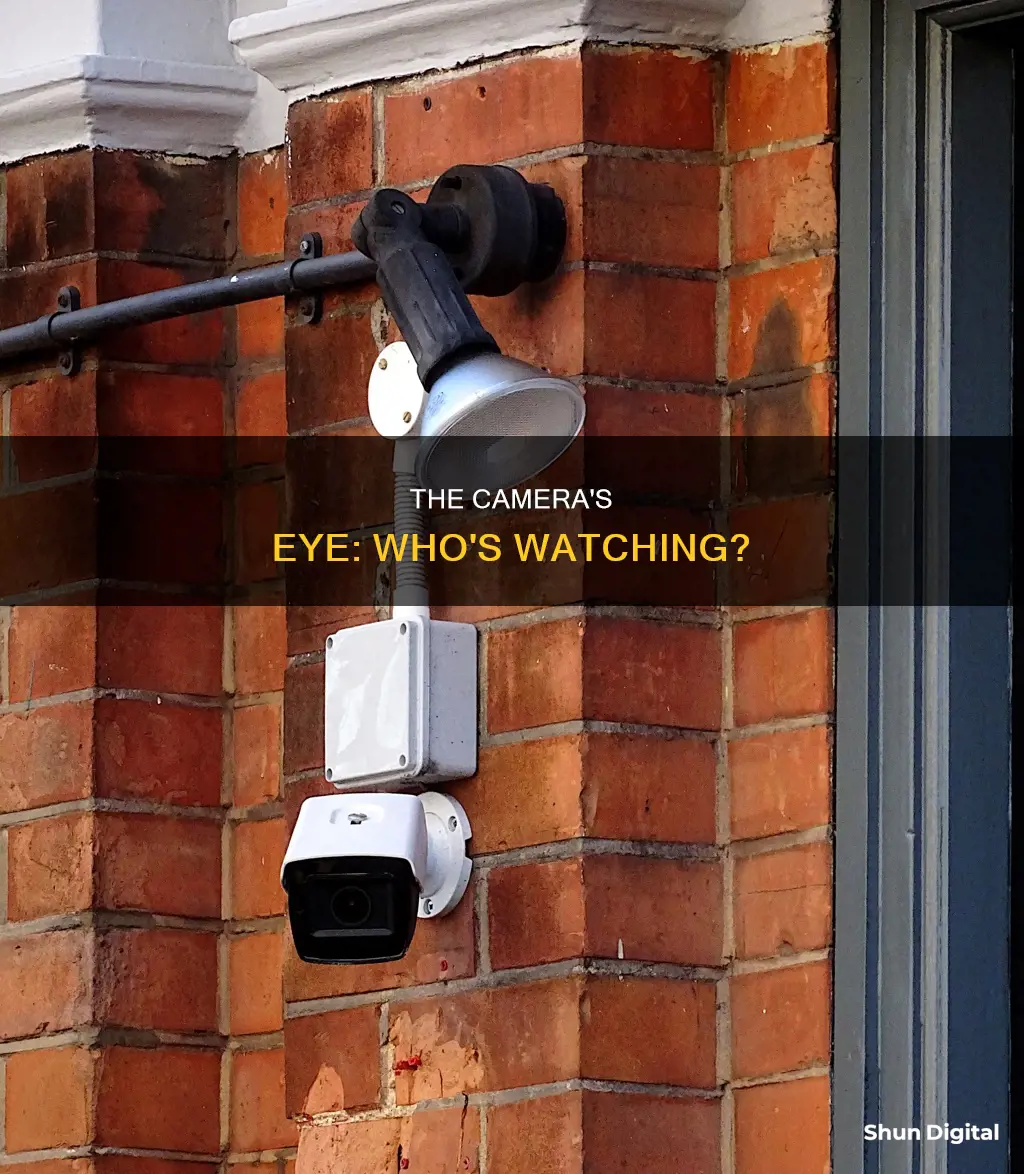
In today's world, it's easy to feel like someone is always watching. And unfortunately, that's not just paranoia – it's a real possibility, especially when it comes to our phones and other devices. Our smartphones have become powerful surveillance tools, with hackers, cybercriminals, and even governments finding ways to access our cameras and spy on us. So, how can we know if someone is watching us through our phone cameras? And what can we do to protect ourselves?
There are several signs that may indicate someone is accessing your phone's camera. For example, keep an eye on your data usage – if you notice an increase that can't be explained by your browsing habits, it could mean that someone is watching. Strange camera behaviour, such as the camera turning on by itself or running slowly, is another red flag. Checking your camera permissions and looking for unfamiliar apps with access to your camera is also a good idea. Monitoring your video call performance, listening for strange sounds during calls, and reviewing your location permissions are other ways to detect potential spying. In addition, keep an eye on your camera light indicator – if it's on when you're not using the camera, it could be a sign that someone else is.
To protect yourself from camera hacking, there are several measures you can take. Using a reliable antivirus or anti-spyware software, such as Norton 360 Deluxe, is a good start. Keeping your operating system and apps updated, avoiding suspicious links and attachments, and strengthening your privacy settings are also important. Be cautious about downloading third-party apps and only download from trusted sources. Additionally, consider covering your camera with a sticker or tape when it's not in use. Taking these steps can help ensure your privacy and security.
| Characteristics | Values |
|---|---|
| Data usage | Higher than usual |
| Background apps | Apps running in the background |
| Camera behaviour | Turns on by itself, runs slowly, crashes frequently |
| Camera permissions | Apps with access to the camera |
| Video call performance | Poor quality |
| Strange sounds | Camera shutter, static, clicking, echoes |
| Location permissions | Apps with access to location |
| Camera light indicator | On when camera is inactive |
| New apps, photos, or video files | Apps, photos, or videos you don't remember adding |
| Battery performance | Poor |
| Device temperature | Higher than usual |
| Suspicious applications | Unfamiliar applications |
| Screen behaviour | Turns on without contact or trigger |
| Files | Photos, videos, or audio files you didn't create |
What You'll Learn

Strange Camera Activity
- Your phone camera turns on by itself or gives an error message that it's already in use.
- You find photos or videos on your device that you don't remember taking.
- Third-party camera apps open on their own.
- Your camera runs slowly and the app crashes frequently.
- Your camera indicator light or flashlight turns on by itself.
If you notice any of these issues, it's important to take steps to protect your privacy and secure your device. Update and restart your phone and apps to see if the problem resolves. If it doesn't, don't ignore it as it could be a sign of spyware or other malicious activity.
In addition to strange camera activity, other signs of potential spying include:
- Increased data usage: Spyware silently gathers and uploads your data, leading to abnormal data consumption.
- Background app activity: Check for unfamiliar apps or suspicious activity in your background app settings.
- Excessive battery drain: Spyware can affect your battery life as it requires a lot of processing power to run.
- Strange sounds during calls: This could indicate a three-way call, with someone listening in or recording your conversation.
- Location permission requests: Apps that don't need your location may be trying to collect this information for malicious purposes.
- New apps, photos, or video files: Spyware can hide in photo, video, and audio files, and may result in unexplained media content on your device.
Access Samsung Camera on the Web: A Step-by-Step Guide
You may want to see also

Background App Activity
If you suspect that someone is watching you through your phone camera, you can check for background app activity by reviewing all the applications on your device. On an iPhone, you can do this by going to the bottom of the settings menu, or by going to "Privacy & Security" in the settings menu, where you can check which specific apps have access to your camera, microphone, and other functions. On an Android device, you can open the Settings menu and go to "Apps" to review your apps individually, or navigate to Security & Privacy > Privacy > Permission Manager to see which apps have access to your camera and microphone.
If you notice any unfamiliar or suspicious applications, it is recommended to delete them and consider performing a factory reset on your device. You can also use anti-spyware tools such as Certo to scan for and remove spyware from your device.
In addition to checking for background app activity, there are other signs that may indicate someone is watching you through your phone camera, including strange camera behaviour, camera light activity, unexpected screen behaviour, and the presence of photos, videos, or audio files that you did not create. It is important to be vigilant and take proactive measures to protect your privacy and security.
Cameras Watching You: What's the Right Term?
You may want to see also

Excessive Data Use
Excessive data usage on your phone is a red flag for spyware. Spyware silently gathers and uploads your data without your knowledge or consent, causing a surge in your data consumption. You may not notice this unless you check your data usage and compare it with your actual usage.
If your browsing habits remain the same but your data usage has increased, this could be a cause for concern. You can check which apps use the most data, but if the spyware is well-hidden, you may not be able to see where the data usage is coming from.
To prevent spyware infections, it is important to practice good cyber hygiene, such as staying on top of software updates and removing old files and apps regularly. Additionally, be cautious of suspicious links and attachments, strengthen your privacy settings, and use reputable security software.
14 Camera Movie: Where to Watch and Stream
You may want to see also

Unfamiliar Apps or Files
Unfamiliar apps and files are clear signs of tampering. Cybercriminals often use unsecured or infected apps to secretly install malware on your device. If someone has access to your phone, they can download malicious apps.
Cybercriminals can also hijack your connection and install malware that way, which is known as a Man-in-the-Middle (MiTM) attack. MiTM attacks are more common on public Wi-Fi networks and websites with poor security.
You can regularly check your downloads folder for anything that shouldn't be there. Spyware also affects your storage availability, and you might notice your storage is full when it shouldn't be. It's a good idea to monitor your storage regularly so that you'll notice strange activity as soon as it happens.
- Strange camera activity: Your phone camera turns on by itself, or you get an error message saying your camera is already in use.
- Excessive data usage: Spyware silently gathers and uploads your data without your knowledge or consent, causing an abnormal surge in your data consumption.
- Poor battery performance: Spyware can negatively affect your phone's battery life because the device must work harder when running a malicious application.
- Your device is warmer than usual: Spyware is constantly listening in and collecting information, requiring a lot of processing power.
- Your screen is acting weird: Malware can impact your phone's performance, causing the display to become glitchy and unresponsive.
Big Brother: Is the Government Spying on Us?
You may want to see also

Camera Indicator Light
The camera indicator light is one of the most common signs that your phone has been hacked. Modern versions of Android and iOS display a small green dot in the status bar when your camera is in use. If you see this, it's worth investigating, especially if the green light appears when the camera should be inactive.
While an elite hacker could potentially disable the indicator light on your device, doing so requires a high level of competence and expertise. Unless you are a serious target for governments or other high-level organisations, it is unlikely that someone with such advanced skills would be interested in you. Therefore, monitoring the state of your indicator light for any unusual activity is an excellent way to know if someone is spying on you through your phone's camera.
Apple products, for example, are designed with privacy in mind. The FaceTime HD camera built into Mac computers uses a camera indicator light that glows green when the camera is active, so you always know when the camera is on. The camera is engineered so that it cannot activate without the camera indicator light also turning on.
However, a recent academic study found that few computer users notice indicator lights, and even fewer realise that the camera is always recording when the light is on. The lack of awareness, say researchers, makes people more vulnerable to webcam spying.
If you are concerned about someone targeting your device, you can help protect your privacy by covering the camera with a sticker, tape, or a camera cover.
Apple Watch: Camera Symbol Explained
You may want to see also
Frequently asked questions
There are several signs that might indicate that your phone camera is being used to spy on you. These include strange camera behaviour, such as the camera turning on by itself or frequent alerts; odd camera light behaviour, such as the light being on even when the camera is not in use; and unexpected screen behaviour, such as the screen turning on without any apparent trigger. Other signs include finding photos, videos or audio files on your device that you don't remember creating, higher data usage, and poor video call performance.
If you suspect that someone is spying on you through your phone camera, you should delete any suspicious applications and consider doing a factory reset of your device. You can also use a spyware detection tool, such as Certo, to scan for and remove spyware.
Yes, it is possible for someone to access your laptop camera remotely and use it to watch you without your knowledge. This is known as "camhacking".
If your phone has been infected with spyware, employers and former partners are usually the prime suspects. However, in many cases, the person spying on you may be a random hacker who is trying to obtain valuable information.
To protect your phone camera from being hacked, you should take proactive measures such as not jailbreaking your phone, avoiding suspicious links and attachments, strengthening your privacy settings, being cautious about third-party apps, and using mobile antivirus software.







